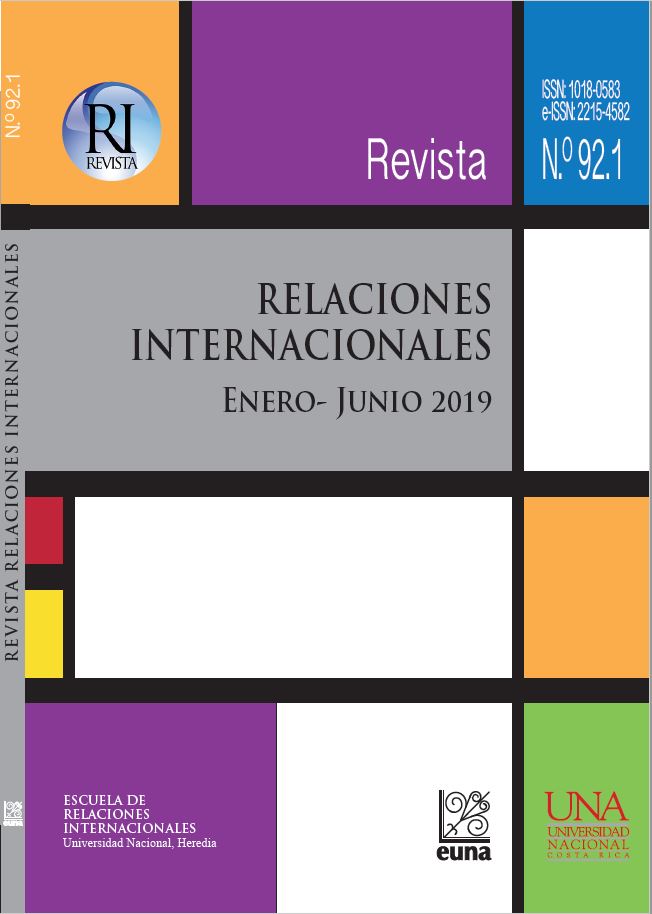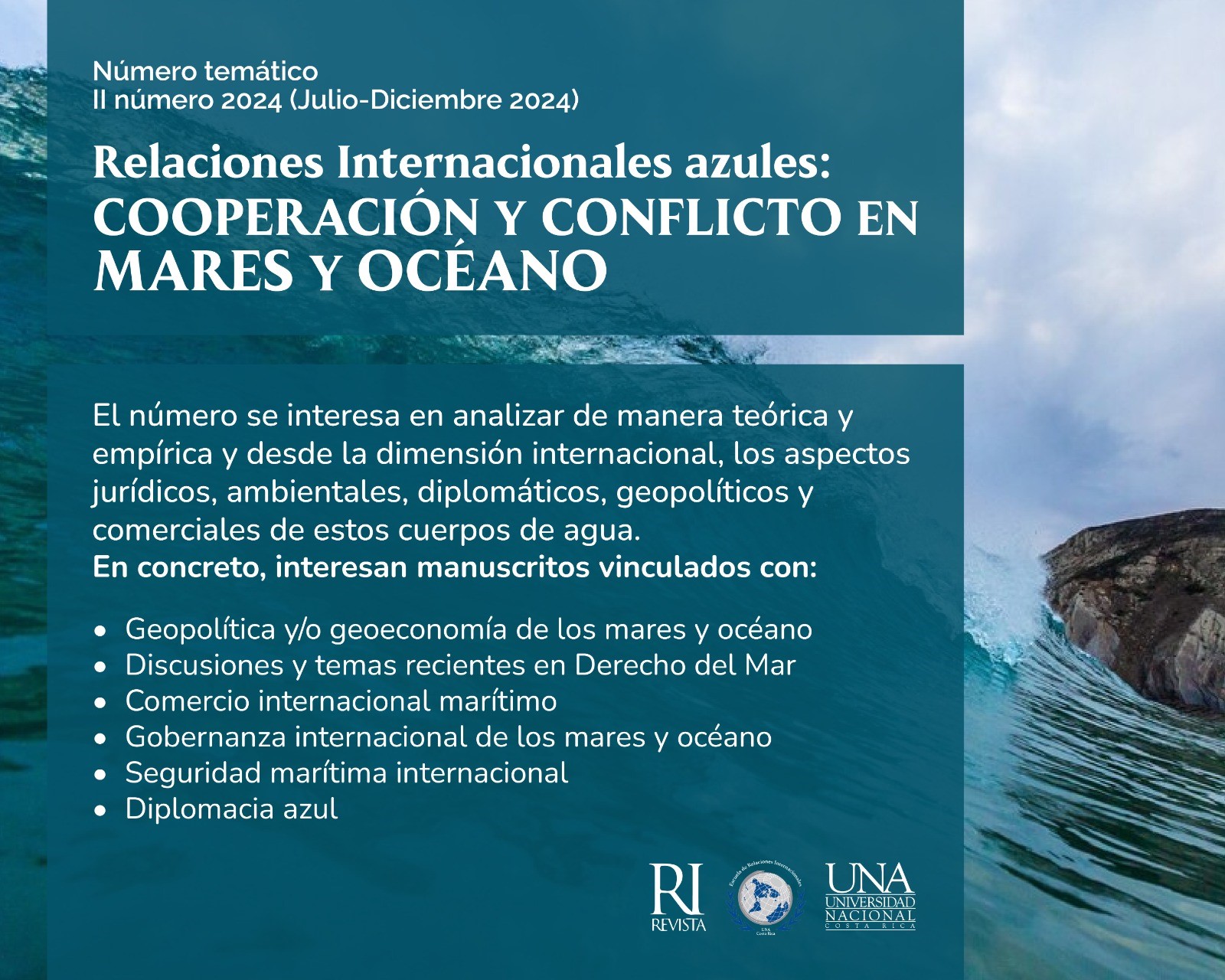Política exterior de Turquía en Venezuela: ¿Cuáles son los factores que pueden explicar el recién acercamiento acelerado de Turquía con Venezuela en los últimos años?
DOI:
https://doi.org/10.15359/ri.92-1.2Palabras clave:
Política exterior de Turquía, América Latina, Venezuela, Relaciones Internacionales, Interés Estratégico, Turquía, Acercamiento, Apertura estratégica, Constructivismo, RealismoResumen
En las últimas décadas, Venezuela se ha convertido en uno de los países de América Latina objetivo de la nueva política exterior de Turquía en regiones hasta entonces olvidadas. Sin embargo, el interés de Turquía en Venezuela se mantuvo principalmente en el papel. No fue hasta 2016 que las relaciones entre Venezuela y Turquía comenzaron a florecer en todos los niveles; diplomático, político y económico. Desde entonces, el presidente venezolano Nicolás Maduro realizó cuatro visitas a Turquía, mientras que Recep Tayyip Erdoğan se convirtió en el primer presidente turco en visitar Venezuela. Los gobiernos de Maduro y Erdoğan se han convertido en firmes partidarios uno del otro en la política internacional. Asimismo, en 2018 el volumen de comercio entre ambos países superó el total de la suma del volumen comercial de los cinco años anteriores. Haciendo uso de las teorías del realismo y el constructivismo de las Relaciones Internacionales, el artículo analiza por qué Turquía comenzó de pronto a aplicar una política exterior activa hacia Venezuela, un país latinoamericano que dista histórica, cultural y geográficamente de Turquía y con el que las relaciones estaban estancadas. El artículo llega a la conclusión de que, en los últimos dos años, el gobierno del AKP de Erdoğan ha obtenido beneficios materiales y apoyo ideológico gracias a las pujantes relaciones con el gobierno de Maduro.
Referencias
Ahiska, M. (2003). Occidentalism: The Historical Fantasy of the Modern. South Atlantic Quarterly 102 (2-3), 351–379.
Akıllı, E. (2015, January 6). Turkey’s ever expanding ‘helping hand’ over Latin America. Daily Sabah. Retrieved from https://www.dailysabah.com/opinion/2015/01/06/turkeys-ever-expanding-helping-hand-over-latin-america
Altunişik, M. B. & Martin, L. G. (2011). Making Sense of Turkish Foreign Policy in the Middle East under AKP. Turkish Studies 12 (4), 569–587.
Ayata, B. (2014). Turkish Foreign Policy in a Changing Arab World: Rise and Fall of a Regional Actor? Journal of European Integration 37 (1), 95–112.
Anadolu Agency (2018, November 28). Asociación turca de industriales se expande en Latinoamérica. Retrieved from https://www.aa.com.tr/es/econom%c3%ada/asociaci%c3%b3n-turca-de-industriales-se-expande-en-latinoam%c3%a9rica/1324290#
Aras, B. (2017). Turkish Foreign Policy after July 15. Sabanci University. Retrieved from http://ipc.sabanciuniv.edu/wp-content/uploads/2017/02/Turkish-Foreign-Policy-After-July-15_Bulent-Aras.pdf
Daily Sabah (2017, December 13). Venezuela’s Maduro appears as surprise guest at OIC summit on Jerusalem. Retrieved from https://www.dailysabah.com/diplomacy/2017/12/13/venezuelas-maduro-appears-as-surprise-guest-at-oic-summit-on-jerusalem
Daily Sabah (2018, December 3). Turkey working to 'diversify and deepen' cooperation with Venezuela: Erdoğan. Daily Sabah. Retrieved from https://www.dailysabah.com/diplomacy/2018/12/03/turkey-working-to-diversify-and-deepen-cooperation-with-venezuela-erdogan
Dalay, G. (2017, February 27). What is driving Turkish foreign policy today? Aljazeera. Retrieved from http://studies.aljazeera.net/en/reports/2017/02/driving-turkish-foreign-policy-today-170227091853603.html
Daragahi, B. (2019, January 24). Venezuela Crisis: How Turkey has become Venezuela strongman's staunchest defender of president Nicolas Maduro. Independent. Retrieved from https://www.independent.co.uk/news/world/middle-east/venezuela-crisis-turkey-nicolas-maduro-president-erdogan-support-juan-guaido-opposition-a8744551.html
Davutoğlu, A. (2013). The Three Major Earthquakes in the International System and Turkey. The International Spectator 48 (2), 1–11.
Donelli, F., & Gonzaléz Levaggi, A. (2018). From Mogadishu to Buenos Aires: The Global South in the Turkish Foreign Policy in the Late JDP Period (2011–2017). In E. Parlar Dal (Ed.), Middle Powers in Global Governance (pp. 53–73). Cham: Springer International Publishing.
Dunne, T., Kurki, M., & Smith, S. (Eds.). (2013). International relations theories: Discipline and diversity (3rd ed.). Oxford, New York: Oxford University Press.
Gonzaléz Levaggi, A. (2012). Turkey and Latin America: A New Horizon for a Strategic Relationship. Perceptions, XVIII(4), 99–116. SAM. Retrieved from http://sam.gov.tr/wp-content/uploads/2014/03/Ariel_Levaggi.pdf
Gonzaléz Levaggi, A. (2016a). Potencias (re)emergentes hacia un mundo policéntrico: Rusia y Turquía frente a América Latina. Relaciones Internacionales, 21–46.
Gonzaléz Levaggi, A. (2016b). Towards the peripheries of the Western World: Eurasian regional policies in Latin America, 60–87.
Gozzer, S. (2019, February 21). Crisis en Venezuela: por qué la incertidumbre sobre el futuro de Nicolás Maduro interesa tanto en países como Rusia, India, Turquía y Zimbabue. BBC News. Retrieved from https://www.bbc.com/mundo/noticias-america-latina-47170209
Grieco, J., Ikenberry, G. J., & Mastanduno, M. (2015). Introduction to International Relations: Enduring Questions & Contemporary Perspectives: PALGRAVE.
Gürbüz, Ş. N. (2018, November 27). Turkey seeks to further boost Latin America ties with Erdoğan's upcoming visit. Daily Sabah. Retrieved from https://www.dailysabah.com/diplomacy/2018/11/27/turkey-seeks-to-further-boost-latin-america-ties-with-erdogans-upcoming-visit
Hurriyet Daily News (2018, December 4). Turkey determined to enhance ties with Venezuela: Erdoğan. Hurriyet Daily News. Retrieved from http://www.hurriyetdailynews.com/turkey-determined-to-enhance-ties-with-venezuela-erdogan-139417
Jaramillo, K. (2018, September 2). Why Turkey sees potential in Venezuela despite its crisis? LatinAmerican Post. Retrieved from https://latinamericanpost.com/22978-why-turkey-sees-potential-in-venezuela-despite-its-crisis
Kanat, K. B. (2014). Theorizing the Transformation of Turkish Foreign Policy. Insight Turkey 16 (1), 65–84.
Kasapoğlu, Ç. (2018, December 3). Türkiye ve Venezuela neden yakınlaştı? BBC News. Retrieved from https://www.bbc.com/turkce/haberler-dunya-45162491
Koerner, L. (2016, October 11). Venezuela’s Maduro Signs Deals with Turkey and Azerbaijan, Meets with Putin. Venezuelanalysis. Retrieved from https://venezuelanalysis.com/news/12717
Lowen, M. (2019, February 2). Turkey warned over Venezuela gold trade. BBC News. Retrieved from https://www.bbc.com/news/world-europe-47092784
Mearsheimer, J. J. (2013). Structural Realism. In T. Dunne, M. Kurki, & S. Smith (Eds.), International relations theories: Discipline and diversity (3rd ed.). Oxford, New York: Oxford University Press.
Minister of Foreign Affairs. Türkiye - Venezuela Siyasi İlişkileri (Turkey - Venezuela Political Relations). Retrieved from http://www.mfa.gov.tr/turkiye-venezuela-siyasi-iliskileri.tr.mfa
Olmo, G. D. (2018, December 3). Qué gana Maduro con la visita del presidente de Turquía y cuál es la relación entre Venezuela y ese país. BBC News. Retrieved from https://www.bbc.com/mundo/noticias-america-latina-46415837
Oner, I. (2018, July 12). Erdogan’s Venezuela adventure turns into another bargaining chip. Global Americans. Retrieved from https://theglobalamericans.org/2018/12/erdogans-venezuela-adventure-turns-into-another-bargaining-chip/
Öniş, Z., & Kutlay, M. (2017). The dynamics of emerging middle-power influence in regional and global governance: The paradoxical case of Turkey. Australian Journal of International Affairs, 71(2), 164–183. https://doi.org/10.1080/10357718.2016.1183586
Önsoy, M. (2017). Latin America-Turkey Relations: Reaching Out to Distant Shores of the Western Hemisphere. In P. Gözen Ercan (Ed.), Turkish Foreign Policy: International Relations, Legality and Global Reach (pp. 237–258). Cham, s.l.: Springer International Publishing.
Parlar Dal, E. (2018). Profiling Middle Powers in Global Governance and the Turkish Case: An Introduction. In E. Parlar Dal (Ed.), Middle Powers in Global Governance (pp. 1–32). Cham: Springer International Publishing.
Reuters (2018, July 18). Venezuela says it is refining gold in Turkey following sanctions | Reuters. Retrieved from https://www.reuters.com/article/venezuela-gold/venezuela-says-it-is-refining-gold-in-turkey-following-sanctions-idUSL1N1UE1DV
Rubin, M. (2019, February 1). Will Turkey follow Venezuela’s lead? Washington Examiner. Retrieved from https://www.washingtonexaminer.com/opinion/will-turkey-follow-venezuelas-lead
Shapiro, J. L. (2017, October 10). A new era in Turkish-Venezuelan relations? TRT World. Retrieved from https://www.trtworld.com/opinion/a-new-era-in-turkish-venezuelan-relations--11205
Singh, M., & Jeffrey, J. F. (2018, March 19). The U.S. Alliance With Turkey Is Worth Preserving. Foreign Policy. Retrieved from https://foreignpolicy.com/2018/03/19/the-u-s-alliance-with-turkey-is-worth-preserving/
Slaughter, A. M. (2011). International relations, principal theories. Max Planck Encyclopedia of Public International Law, 1–7.
Sputnik (2017, October 13). USA, Oil and Sovereignty: Factors Driving the Venezuelan-Turkish Rapprochement. Retrieved from https://sputniknews.com/analysis/201710131058217331-venezuela-turkey-relations-analysis/
Sputnik (2018, May 18). Erdoğan ve Maduro telekonferansla ticaret anlaşması imzaladı. Retrieved from https://tr.sputniknews.com/turkiye/201805181033494078-erdogan-maduro-telekonferans-anlasma/
Sputnik (2019, January 15). Venezuela to Refine Gold in Turkey Amid US Sanctions – Report. Retrieved from https://sputniknews.com/latam/201901151071499620-venezuela-gold-refine-turkey/
Tekin, B. Ç., & Tekin, R. B. The Limits, Dilemmas and Paradoxes of Turkish Foreign Policy: A Political Economy Perspective. LSEE Papers on South Eastern Europe. Retrieved from http://www.lse.ac.uk/LSEE-Research-on-South-Eastern-Europe/Assets/Documents/Publications/Paper-Series-on-SEE/Baris-Tekin-edited-final.pdf
TIKA, Turkish Cooperation and Coordination Agency. (2018a). TİKA's Projects in Venezuela. Retrieved from https://www.tika.gov.tr/en/news/tika_s_projects_in_venezuela-49636
TIKA, Turkish Cooperation and Coordination Agency. (2018b). Turkey keeps breaking records in humanitarian aid and development assistance. Retrieved from https://www.tika.gov.tr/en/news/turkey_keeps_breaking_records_in_humanitarian_aid_and_development_assistance-49351
Weise, Z. (2018, December 3). The Turkey-Venezuela mutual admiration society: Latin American country is increasingly isolated, but Ankara's not joining in. Politico. Retrieved from https://www.politico.eu/article/the-turkey-venezuela-mutual-admiration-society-turkish-president-recep-tayyip-erdogan-nicolas-maduro/
Descargas
Publicado
Cómo citar
Número
Sección
Licencia
Esta publicación está adscrita a Creative Commons; deben respetarse sus atribuciones y restricciones.
Los autores/as que publiquen en esta revista aceptan las siguientes condiciones:
- Los autores/as conservan los derechos de autor y ceden a la revista el derecho de la primera publicación, con el trabajo registrado con la Licencia Creative Commons Atribución-NoComercial-CompartirIgual 4.0 Internacional, que permite a terceros utilizar lo publicado siempre que mencionen la autoría del trabajo y a la primera publicación en esta revista.
- Los autores/as pueden realizar otros acuerdos contractuales independientes y adicionales para la distribución no exclusiva de la versión del artículo publicado en esta revista (p. ej., incluirlo en un repositorio institucional o publicarlo en un libro) siempre que indiquen claramente que el trabajo se publicó por primera vez en esta revista.
- Se permite y recomienda a los autores/as a publicar su trabajo en Internet (por ejemplo en páginas institucionales o personales) antes y durante el proceso de revisión y publicación, ya que puede conducir a intercambios productivos y a una mayor y más rápida difusión del trabajo publicado.
Revista de Relaciones Internacionales por Universidad Nacional de Costa Rica está bajo una Licencia Creative Commons Atribución-NoComercial-SinDerivar 4.0 Internacional









.png)



2.png)
